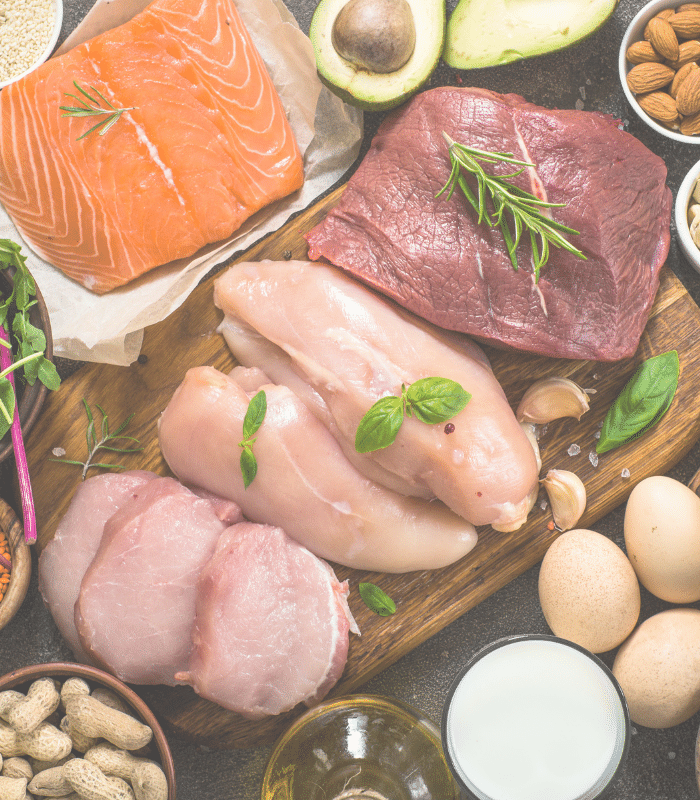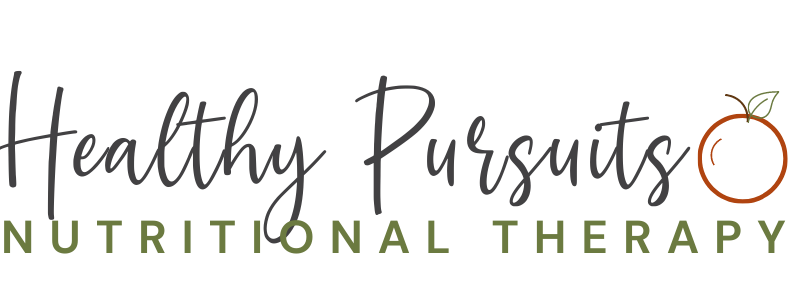Most people are not eating enough protein.
When you consume foods high in protein, they break down into amino acids which serve as building blocks for muscles, organs, cells, enzymes, antibodies, brain neurotransmitters, hormones and more. In short, every single cell in the human body contains (and therefore needs) protein.
The recommended dietary intake for protein in this country is .8g/kg of bodyweight. For a 150 pound person that’s only about 60grams of protein. This is so low it’s silly.
The problem is, this “recommended” dietary intake is not set at a level for optimal health. It’s set at a level that will keep you alive.
I don’t know about you, but I want to feel great, and have energy to do the things I want to do. I want to feel strong and capable for as long as I can.
I don’t just want to be alive.
The RDA for protein isn’t going to get me (or you!) there. Not even close.
Signs you’re not eating enough protein:
- Feeling easily fatigued
- Getting sick often
- Trouble focusing
- Easily injured
- Slow healing
- Sugar and carb cravings
- Thinning hair and brittle nails
- Increased body fat
- Hormonal imbalances
- Mood changes
When you don’t provide your body the raw materials it needs for all the trillions of cells you’re made of to work optimally, things are going to start to break down.
Your body is going to prioritize life-sustaining tissue first and will pull from other areas that don’t “need” the nutrients as much.

So your important organs might have what they need to keep chugging along, but the rest of your body will start to have problems.
Why people are not eating enough protein:
With modern lifestyles it’s very easy to under-eat protein. People are busy, stressed, and want quick and easy foods. Most of the time these quick and easy foods are high in refined carbohydrates and low in protein.
Even if they’re not high in refined carbs, they are likely still low in protein, and that’s a problem. The convenience foods people often turn to generally provide little nutrition and therefore displace more nutritious foods.
You don’t just need to eat calories, you need to eat nutrients.
Protein is also under-consumed because the guidelines in place are not based on what is actually optimal for human health and wellbeing.
The RDA was set decades ago using nitrogen balance studies which have been shown to be very inaccurate (source). When people are given bad advice and also encouraged to eat low quality foods, it’s no wonder health is suffering.
Along those lines, there is an increasingly strong push to reduce and/or even eliminate meat consumption. This is really a huge topic for another day but the anti-meat propaganda is strong these days, though quite misguided.
While you certainly can get protein from plant-based sources, the fact is that animal proteins are a denser, more easily absorbed source of protein.
For the majority of people I see, adding animal protein is the most effective and efficient way to get them feeling better and addressing their health concerns.

How much protein should you eat?
Some recommend people aim to get about 2g/kg of body weight, which comes out to about a gram per pound of weight.
Others set the recommendation a bit lower at around 1.6g/kg.
For a 150 pound person, he or she should be consuming about 110 grams of protein per day to help achieve optimal health.
To do the math for yourself, just take your bodyweight and divide it by 2.205 to get how much you weigh in kg. Then multiply that by 1.6 to get a more appropriate target.
Another way to think about it is to consume a gram of protein for every pound of ideal lean body mass.
To do this, take the weight that you think you’d be at your healthiest and then use a chart like this one to determine the body fat percentage where you’d be healthiest. Subtract that BF % from 100 and take that number X your ideal body weight to get your ideal lean body mass. It’s basically the amount of your body that isn’t fat (or that wouldn’t be fat when you’re at your ideal weight)
For example, let’s say we have a 42 year old 175lb woman who knows her frame would do better around 140lbs. She’d like to be around 21% body fat.
She’d take 145 (her ideal weight) X .79 (100% – 21% = 79%) to get how many grams of protein she needs per day, in this case it’d be around 114.
Are there concerns of too much protein?
These levels are not going to cause any problems from too much protein. To get to the point where it might start to be too much, you’d have to be consuming around 3-4g/kg of body weight on a regular basis. And I know you’re not doing that!
Final thoughts:
If you’re not sure how much protein you’re currently getting, I’d recommend getting a simple kitchen scale and do some measuring of raw meats and seafood before cooking.
I’m generally not a huge fan of food tracking apps long term but to get a general idea of where you currently are with protein and where you might need to be, they can be quite helpful. I’ve used Carb Manager in the past but there are several free ones out there that would fit the bill!
I’m willing to bet if you made an effort to get your protein up to the ideal level for you body for 3-4 weeks you’ll notice some huge improvements!
